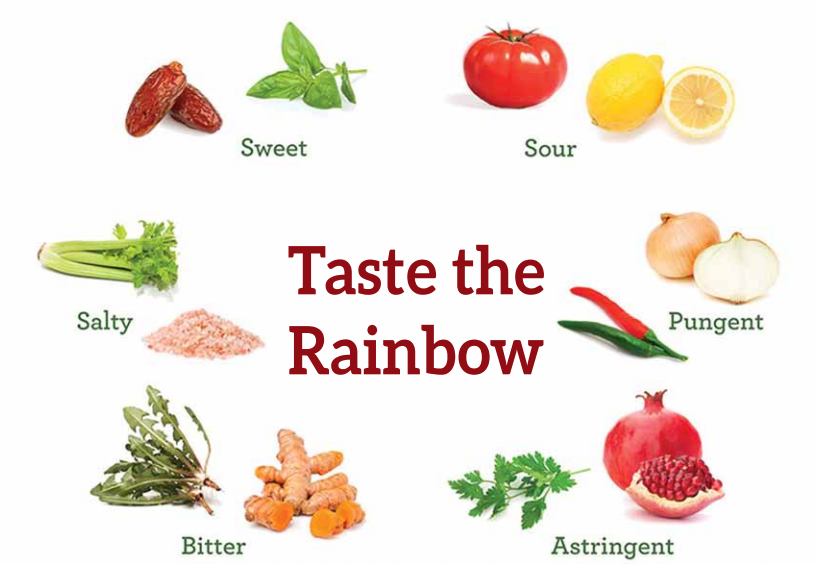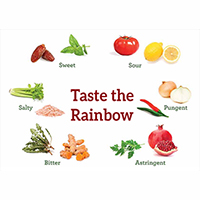Taste the Rainbow

By Chahna Tailor
Happy July!
Some people eat to live, while others (like me!) live to eat. The thing is, everything you eat becomes your body. Your food can balance you or imbalance you; it can build a healthy body or an unhealthy body. So, how do you ensure a good balance? Let’s review some basic Ayurveda principles related to doshas and tastes.
In Ayurveda, there are six rasa, flavors that make up all tastes. Each taste is a combination of two of the five elements and also falls under one or two doshas, Vata (V), Pitta (P), and/or Kapha (K).
- Sweet is a combination of earth (K) and water (K) which can be used for building tissues (and weight). It is also calming for the nerves.
- Sour is a mixture of earth (K) and fire (P) and can help increase the absorption of minerals. It helps with tissue cleansing.
- Salty is a blend of fire (P) and water (K) and is great for stimulating digestion, lubricating tissues, and improving a person’s taste ability.
- Pungent is the fusion of fire (P) and air (V) and helps with increasing metabolism and stimulating digestion.
- Bitter is made up of air (V) and ether (V) and has a light energy which helps with detoxifying.
- Astringent is a mix of air (V) and earth (K) and is drying, which helps with drying fat, absorbing water, and tightening your tissues.
Which ones are right for you?
Well, let us look at the doshas. When it comes to balancing a dosha, think of a seesaw. You must put enough of the opposite to balance. If one side is too light, you add some heaviness. If one side is too heavy, you take something away to make it lighter. Ayurveda works in the same way.
Sweet, Sour, and Salty increase Kapha. All three of these tastes have a prominence of Kapha elements. So, if you are Kapha, it is best to avoid these tastes, especially Sweet since it is a combination of both Kapha elements. You would benefit from eating foods that are more predominant with Vata elements, such as Pungent, Astringent, and Bitter.
Sour, Salty, and Pungent all have the fire element. These increase Pitta. If you notice that your Pitta is out of balance, it is best to avoid these tastes (especially Salty because it has both Pitta elements) and consume foods that are more prominent in Kapha and Vata elements such as Sweet, Astringent, and Bitter.
Pungent, Astringent, and Bitter tastes all have air within them. These increase Vata. If you have a Vata imbalance, these tastes should be avoided, especially Bitter because it has both Vata elements in it. Try to consume foods that are high in Kapha and Pitta elements, such as Sweet, Sour, and Salty.
Keep in mind, everything is a balance. If one of your doshas is out of balance, it does not benefit you to binge eat balancing elements. It will end up raising that dosha. For example (and personal experience!), if your Vata is high and you consistently eat Sweet and Salty foods, you can end up increasing your Kapha to the point where it comes out of balance. Maybe some of your Vata symptoms go away, but you might also see an increase in mucous or even weight gain since your Kapha has now increased.
So, again, balance.
The best approach is to try to include all of the tastes in one meal so that your palette is nicely balanced. That’s why a desi meal is the best – utilizing our spices can help to keep us from overeating one taste. There is endless knowledge on the 6 rasa, but this is just a taste of the rainbow!
 About the Author
About the Author
Chahna Tailor, a certified yoga instructor, has a background in occupational therapy and health science & administration. Chahna deepened her yoga practice by training in Rishikesh, India, where she studied the science behind yoga as a whole. Chahna provides yoga, pranayama, and meditation services through her company Namaskar To You. A volunteer for Ekal Vidyalaya, Chahna also Registered Yoga Teacher with Yoga Alliance. She is currently pursuing a doctoral degree in Ayurvedic Medicine while continuing her self-studies in yoga.































